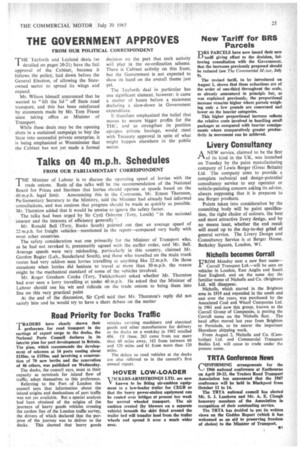Talks on 40 m.p.h. Schedules
Page 27

If you've noticed an error in this article please click here to report it so we can fix it.
FROM OUR PARLIAMENTARY CORRESPONDENT
THE Minister of Labour is to discuss the operating speed of lorries with the trade unions. Basis of the talks will be the recommendation of the National Board for Prices and Incomes that lorries should operate at speeds based on the
40 m.p.h. legal limit. Announcing this in the Commons, Mr. Ernest Thornton, Parliamentary Secretary to the Ministry, said the Minister had already had informal consultations, and was anxious that progress should be made as quickly as possible. Mr. Thornton added that it would be unwise to ignore the safety factor.
The talks had been urged by Sir Cyril Osborne (Tory, Louth) "in the national interest and the interests of efficiency generally
Mr. Ronald Bell (Tory, Bucks South) pointed out that an average speed of 22 m.p.h. for freight vehicles—mentioned in the report—compared very badly with most other countries.
The safety consideration was one primarily for the Minister of Transport who, as he had not revoked it, presumably agreed with the earlier order, said Mr. Bell. Average speeds were very misleading, particularly in this country, claimed Mr. Gordon Bagier (Lab., Sunderland South), and those who travelled on the main trunk routes had very seldom seen lorries travelling at anything like 22 m.p.h. On those occasions when lorries did hesitate to travel at more than 30 m.p.h. the reason might be the mechanical standard of some of the vehicles involved. Mr. Roger Gresham Cooke (Tory, Twickenham) asked whether Mr. Thornton had ever seen a lorry travelling at under 40 m.p.h. He asked that the Minister of Labour should use his wit and ridicule on the trade unions to bring them into line on this very practical point At the end of the discussion, Sir Cyril said that Mr. Thornton's reply did not satisfy him and he would try to have a short debate on the matter












































































































